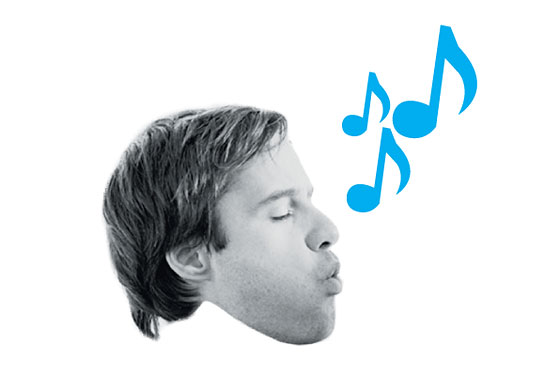
More than a year after its release, the song “Pumped Up Kicks,” by the California band Foster the People, is hanging around the top five of the Billboard Hot 100, a feat rarely achieved by anything anyone would try to call rock, and even more rarely by anything anyone would try to call indie music. It’s the sort of tune one imagines might be nice for driving around someplace other than New York—easy and breezy, with an extremely sticky chorus. Toward the end, the melody of the chorus reappears in the form of a whistle, surely the breeziest instrument yet concocted by mankind.
Whistling’s begun to seem like a calling card for this type of single—the winsome, ever so mildly hip track that crosses over into mainstream consciousness. It started with the 2006 song “Young Folks,” by Swedish trio Peter Bjorn & John, another sleeper hit featuring happy-go-lucky tootling. Something about this mood is absolutely adored by advertisers, who’ve pounced on cheery whistling to telegraph a sense of quirk and ease around their products. See, for instance, Edward Sharpe and the Magnetic Zeros, whose entire fan base must work in TV; the Western whistling in their single “Home” has been featured in an NFL promo, an episode of Community, and an episode of Ugly Betty. See also “Let’s Go Surfing,” by terrifically flouncy Brooklyn romantics the Drums, whose chipper whistling was snipped and looped into a Volkswagen commercial. See also also the video for “Pumped Up Kicks.” The song’s few lyrics are about an embittered kid who’s acquired a weapon (“Better run, run, run,” goes the chorus, “outrun my bullet”), but the footage is mostly sunset scenes of the band throwing Frisbees, grabbing at koi, and wandering stylishly; it looks exactly like a smartphone commercial. Columbia Records markets this act as three guys with a whistler’s vibe—effortless, laid-back, secure—not as three fellows with important thoughts on alienation and gun violence. The marketing and the music speak to the same audience: those who grew up amid wide green lawns and now roam in happy packs through college quads and urban boutiques.
Between two wars and the grinding economic news that middle-class contentment is, for a great share of the population, eroding and out of reach, these have not always been years in which you’d expect quaint whistles to prove so popular. (Whistling is the sound of skipping down streets and leaning rakishly in doorways, not slouching through the unemployment line.) For some, though, that piping must seem fantastically appealing, the sound of some stylish, idyllic world where everyone is calm and interesting, there is ample parking at the farmers’ market for your European midsize sedan, and the trunk is full of artisanal pickles instead of store-brand bulk goods. There is an expression for this sort of thing, an idiom for the blissful notion that things will be okay, even as reality suggests it could easily work out otherwise: It’s called “whistling in the dark.”
Have good intel? Send tips to intel@nymag.com.